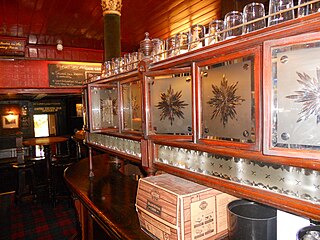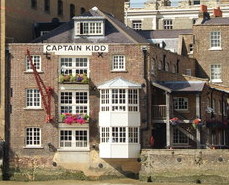
A pub is in several countries a drinking establishment licensed to serve alcoholic drinks for consumption on the premises. The term first appeared in England in the late 17th century, to differentiate private houses from those open to the public as alehouses, taverns and inns. Today, there is no strict definition, but the Campaign for Real Ale (CAMRA) states a pub has four characteristics:
- is open to the public without membership or residency
- serves draught beer or cider without requiring food be consumed
- has at least one indoor area not laid out for meals
- allows drinks to be bought at a bar

Holborn, an area in central London, covers the south-eastern part of the London Borough of Camden and a part of the Ward of Farringdon Without in the City of London.

Covent Garden is a district in London, on the eastern fringes of the West End, between St Martin's Lane and Drury Lane. It is associated with the former fruit-and-vegetable market in the central square, now a popular shopping and tourist site, and with the Royal Opera House, itself known as "Covent Garden". The district is divided by the main thoroughfare of Long Acre, north of which is given over to independent shops centred on Neal's Yard and Seven Dials, while the south contains the central square with its street performers and most of the historical buildings, theatres and entertainment facilities, including the London Transport Museum and the Theatre Royal, Drury Lane.

High Holborn is a street in Holborn and Farringdon Without, Central London, which forms a part of the A40 route from London to Fishguard. It starts in the west at the eastern end of St Giles High Street and runs past the Kingsway and Southampton Row, becoming Holborn at its eastern junction with Gray's Inn Road. The western stretch, as far as Drury Lane, was formerly known as Broad Street. On High Holborn, traffic flows one-way westbound from its junction with Drake Street to its western end, and flows both ways for the remainder.

The Fitzroy Tavern is a public house situated at Charlotte Street in the Fitzrovia district of central London, England, owned by Samuel Smith Old Brewery.

The Princess Louise is a public house situated on High Holborn, a street in central London. Built in 1872, it is best known for its well-preserved 1891 Victorian interior, with wood panelling and a series of booths around an island bar. It is a tied house owned by the Samuel Smith Old Brewery of Tadcaster, Yorkshire.

The Ye Olde Mitre is a Grade II listed public house at 1 Ely Court, Ely Place, Holborn, London EC1N 6SJ.

The Flask is a Grade II listed public house at 14 Flask Walk, Hampstead, London, on the site from where the trade in Hampstead mineral water was run, and which is mentioned in the eighteenth-century novel Clarissa. It has been owned by Young's Brewery since 1904.

The Salisbury is a Grade II listed public house at 91–93 St Martin's Lane, Covent Garden, London which is noted for its particularly fine late Victorian interior with Art Nouveau elements.

The Half Moon is a Grade II* listed public house at 10 Half Moon Lane, Herne Hill, London. It is one of only 270 pubs on the Campaign for Real Ale's National Inventory of Historic Pub Interiors, was frequented by the poet and writer Dylan Thomas, and was a noteworthy live music venue for nearly 50 years, hosting three gigs by U2 in 1980. In 2015, The Half Moon Public House was listed by Southwark Council as an Asset of Community Value, and is described by Nikolaus Pevsner as, "a cheerful corner pub of 1896".

The Viaduct Tavern is a Grade II listed public house at 126 Newgate Street, Holborn, London. It was built 1874-5, and the interior was remodelled 1898–1900 by Arthur Dixon. It is on the Campaign for Real Ale's National Inventory of Historic Pub Interiors.

The Victoria is a Grade II listed public house at 10a Strathearn Place in Bayswater, London, England. It is on the Campaign for Real Ale's National Inventory of Historic Pub Interiors.

The Malt Shovel is a Grade II listed public house at Potter Street, Spondon, Derby. The pub is known for its unmodernised period interiors and internal design.

The Square and Compass is a Grade II listed public house in Worth Matravers, Dorset. Built in the 18th century as a pair of cottages before becoming a public house, the Square and Compass got its name in 1830 from a landlord who had been a stonemason. The building includes a museum of fossils and other local artefacts and the pub is one of only five nationally that has been included in every edition of CAMRA's Good Beer Guide since 1974.

The Five Mile House is a historic former pub located on Old Gloucester Road in Duntisbourne Abbots, Gloucestershire, England. Built in the 17th century, it is a grade II listed building.

Burlingtons Bar is under the Town House public house in Lytham St Annes, Lancashire, England. It is recorded in the National Heritage List for England as a designated Grade II listed building.

A snob screen is a device found in some British public houses of the Victorian era. Usually installed in sets, they comprise an etched glass pane in a movable wooden frame and were intended to allow middle class drinkers to see working class drinkers in an adjacent bar, but not to be seen by them, and to be undisturbed by the bar staff.

The Captain Kidd is a pub in Wapping, East London, that is named after the seventeenth century pirate William Kidd, who was executed at the nearby Execution Dock. The pub is a Grade II listed building, and was historically used as a coffee warehouse.




















